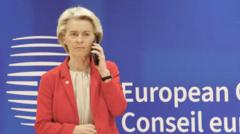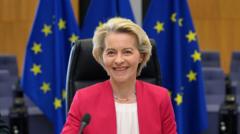In a landmark decision, the European Union's General Court has ordered the European Commission to release text messages exchanged between Ursula von der Leyen and Pfizer CEO Albert Bourla during critical negotiations for Covid-19 vaccine contracts. This ruling overturns the Commission's previous denial of access to these communications, initially requested by investigative journalist Alexander Fanta in 2021 amid concerns over transparency.
European Court Mandates Transparency: Von der Leyen's Pfizer Texts Must Be Released

European Court Mandates Transparency: Von der Leyen's Pfizer Texts Must Be Released
EU court rules against the Commission's refusal to disclose text messages between Ursula von der Leyen and Pfizer's CEO, opening a Pandora’s box around transparency in vaccine negotiations.
The court reprimanded the Commission for failing to provide a credible rationale for withholding the messages that could potentially shine a light on the substantial vaccine deals made with Pfizer, one of which included an agreement for 1.8 billion additional doses. The lack of transparency surrounding these negotiations, already referred to by some as "Pfizergate," potentially jeopardizes von der Leyen's reputation as she confronts scrutiny over her leadership during the pandemic.
The controversy first escalated in April 2021 when a New York Times article exposed von der Leyen’s behind-the-scenes negotiations with Bourla, raising alarms about the EU's approach to public information. Fanta's Freedom of Information request was originally rejected by the Commission, which claimed no such documents could be found. However, the court highlighted a significant lapse in the Commission's record-keeping and underscored that mobile texts should be treated as potentially vital public records.
The ruling has been welcomed by Transparency International as a significant victory for accountability in EU governance, encouraging a decisive shift away from the current restrictive stance on public access to information. The Commission, while stating that it will review the judgment and its implications, has insisted that transparency remains a core principle of its operations.
The court’s decision allows for further inquiries into the handling of crucial communications, putting the Commission on notice to ensure that all relevant records—including SMS texts—are adequately archived and made accessible in the interest of public knowledge as the EU navigates the complexities of vaccine procurement and management.
The controversy first escalated in April 2021 when a New York Times article exposed von der Leyen’s behind-the-scenes negotiations with Bourla, raising alarms about the EU's approach to public information. Fanta's Freedom of Information request was originally rejected by the Commission, which claimed no such documents could be found. However, the court highlighted a significant lapse in the Commission's record-keeping and underscored that mobile texts should be treated as potentially vital public records.
The ruling has been welcomed by Transparency International as a significant victory for accountability in EU governance, encouraging a decisive shift away from the current restrictive stance on public access to information. The Commission, while stating that it will review the judgment and its implications, has insisted that transparency remains a core principle of its operations.
The court’s decision allows for further inquiries into the handling of crucial communications, putting the Commission on notice to ensure that all relevant records—including SMS texts—are adequately archived and made accessible in the interest of public knowledge as the EU navigates the complexities of vaccine procurement and management.





















